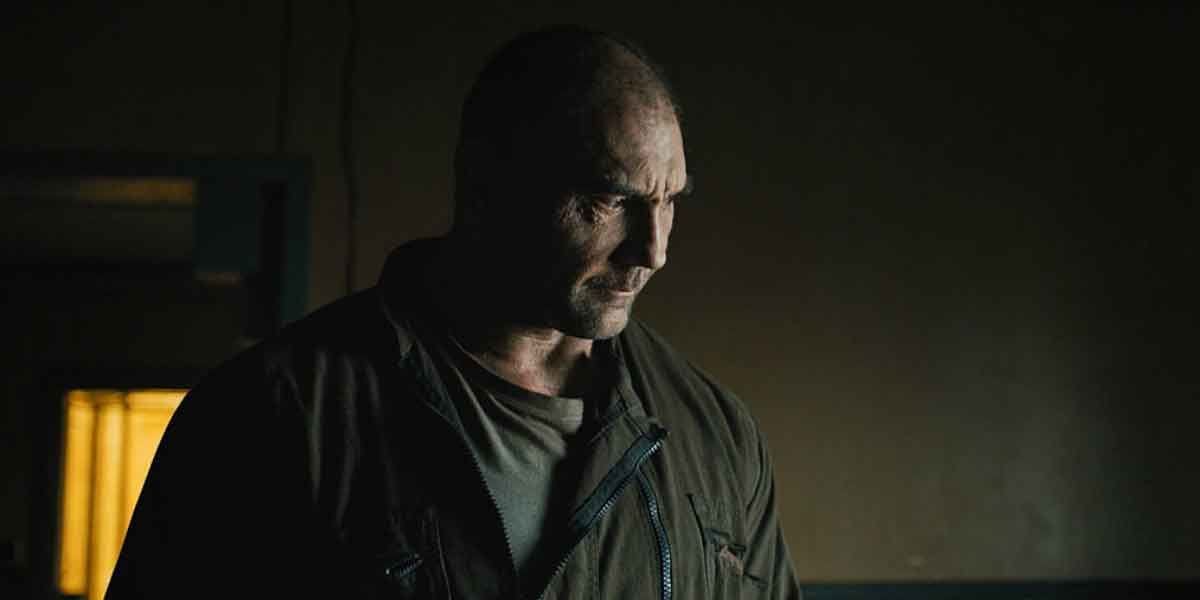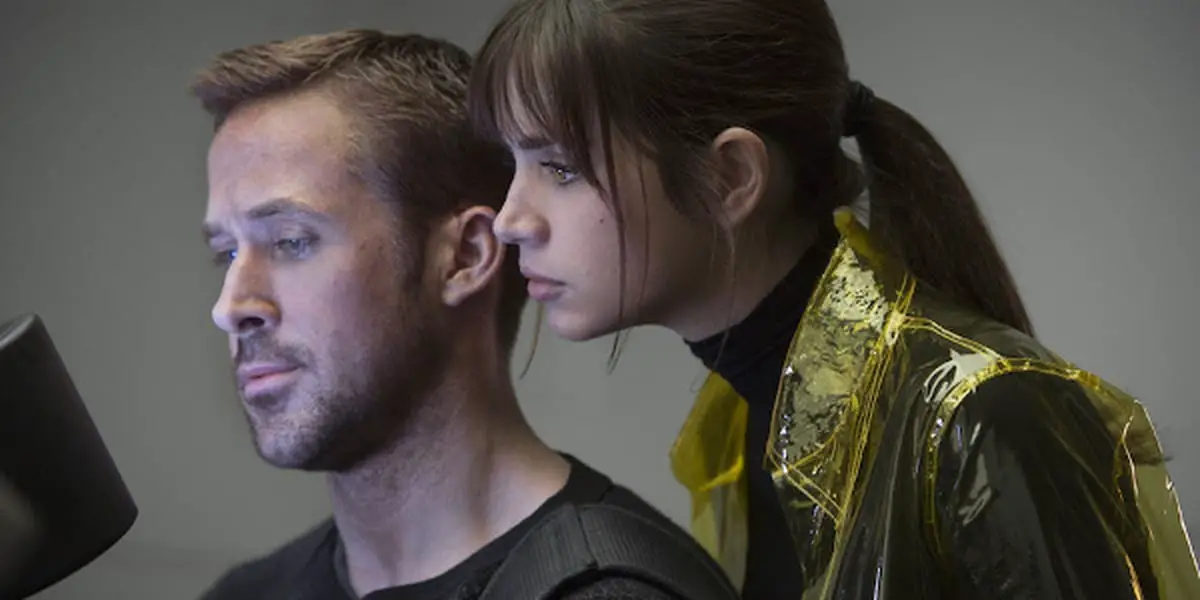Blade Runner 2049 is an impressive looking film and one of great depth, however a common criticism is that its depiction of misogynistic culture, rather than exploring the female experience, is voyeuristic. Director Denis Villeneuve politely dismissed criticisms on the basis that for all the progress we have made, our world is “not kind to women”. Fair enough, but in showing us the cruelty of an oppressive system, does 2049 present us with rounded female characters or grotty avatars for the male viewers to project their fantasies onto?
It’s Okay to Dream a Little. Isn’t It?
Before we explore this issue, it is important to acknowledge that in both Blade Runner films, like most film noir, freedom is a dangerous thing to hope for. So first, we should explore how the dystopia affects all characters, whether they are male, female, Replicant or undecided.
Most of the characters in the world of Blade Runner live on a knife edge. Blade Runner K cannot be paid until he meets “baseline”: a test to make sure he shows no human emotions. If he fails, he will be ‘retired’. Also holograms like Joi are one system update, or one accidental drop of their emanator down the toilet, short of being wiped. The three most powerful characters in 2049 are those who can— almost—dream without censure: Wallace who dreams of conquering the universe with a limitless amount of Replicant slaves, Freysa who dreams of a violent Replicant revolution, and Dr. Ana Stelline who makes artificial memories for Replicants that feel authentic.
Inevitably in a climate of oppression, an Orwellian fear of your own thoughts sets in. This idea was seeded in Blade Runner: The Final Cut, with Deckard’s internal conflict about his identity: drunkenly hitting one note of the piano whilst recalling a memory of a Unicorn running through a wood. The disbelief is written in Deckard’s face, trying to reconcile this fantastical vision with his dreary reality. Above the piano sits some very old Victorian black and white photos—presumably of his family—amongst sheet music; the photos are incongruous with the 2019 setting and there is no other sign of any other familial possessions in the flat, almost like they aren’t memories but planted there. Later on Rachael starts to play the music which Deckard has written. Deckard tells her that the music came to him in a dream. Rachael admits that because of memory implants, she is not sure whether it was her who had piano lessons or Tyrell’s niece? By alluding to innate memories or abilities coming from nowhere, the nature of Deckard is called into question. When Deckard then moves to kiss her neck, it is partly lust, but also because by playing his music it makes him feel grounded in this reality rather than doubting himself. Deckard’s internal conflict is still unresolved in 2049: when Wallace asks Deckard if he was created or not, he whimpers teary-eyed “I know what is real”.

The piano as a symbol of breaking free from repression carries over into 2049. First in Replicant Sapper’s farmhouse, where K notices a depressed piano key. Opening the top of the piano, K finds a little box containing a child’s sock and a photo of a woman holding a baby. The meaning of this is twofold: as well as Sapper keeping the baby’s existence secret, it also effectively makes the piano useless. There is no better way for Sapper to hide from law enforcement than by having no other pursuits to arouse suspicion. Creative thinking is a dangerous occupation, unless you are Dr. Stelline.
The second piano is in the casino where K finds Deckard. The piano is Deckard’s way to keep the memory of Rachael alive and to express the thoughts he no longer has to keep hidden—note the written music on top of the piano. The photos of his family are gone, the only photo he has is of Rachael which he keeps in his penthouse suite, next to the toy carvings he makes for the child he abandoned. Although Deckard is still conflicted about his identity, he only now focuses on what is real. Isolated from society he can express himself. He becomes a mirror of his daughter Dr. Stelline: both having to sacrifice their freedom to think clearly.
So across the board, 2049 Los Angeles is a suitably lawless and grim milieu for everyone to live in existential terror. Throughout history it is often women who suffer the most in times in of hardship. 2049 doesn’t buck that trend.
Everything You Want Her to Be
The world of the original Blade Runner was a misogynist dystopia that crushed female characters dreams and 2049 follows in that vein. Rachael’s original arc saw her move from an independent woman to a cowering wreck, waiting in Deckard’s flat for him to return. Dying in childbirth in-between the films, she gets no justice in 2049 apart from being briefly—and imperfectly—resurrected, just to be executed a minute later. The reoccurring symbolism of the piano frames Rachael and Deckard’s story as a romance but it ignores the “love/hate” scene which follows that scene, which could reasonably be construed as a rape. Also while Deckard does show some questionable behaviour in 2049—he tries to prevent K from escaping the hotel and calls himself a good Blade Runner despite the fact in the first film he’s clearly incompetent— he is far from being the anti-hero he is in the original film. By not acknowledging it, 2049 does the odd thing of problematising its original source material. It also led some critics to think that, rather than just depicting misogyny, could 2049 be actively promoting it?
Hologram Joi’s arc in 2049 is the reverse of Rachael but her fate is the same. One critic described the film as idealising an “unhealthy relationship” and “affection slavery”. However, I’d argue this interpretation ignores Joi’s growing independence and her selfless sacrifice. When we first see Joi, she is on the surface—to paraphrase the Wallace industries slogan—everything K wants her to be. Literally housebound, she caters to her husband’s fantasy of being a Frank Sinatra-type gentlemen by appearing as a ‘50s housewife and listing off facts about Sinatra’s 1965 hit “Summer Wind” like an overenthusiastic Alexa. However, this changes when K buys the emanator: she no longer flits constantly between looks and is listening into K’s conversations without his consent; deliberately playing her start-up sound whenever K talks to another woman to jealously announce her presence. She thinks independently and doesn’t always do what K wants, acting more like a subconscious than a slave: using logic to convince K to download her fully to the emanator but also fulfilling her dream of freeing herself permanently from the flat. The ménage à trois that occurs is her idea and is portrayed in a creepy way: Mariette and Joi go in and out of synch with each other to ghostly effect, the film cuts away to an advertisement of Joi as the action heats up, and next day there is an awkward tension between the couple. Rather than idealised or voyeuristic, the relationship is consciously depicted as a compromise. After Joi’s emanator is crushed under Luv’s heel, K comes face to face with a large naked hologram of Joi, who calls him Joe, a name he presumed she chose for him at random but is also featured in one of his favourite Frank Sinatra songs “One for my Baby(And One More for the Road)”. However, although his belief is tested, K decides to devote himself to the Replicant cause because he thought he saw something that was genuine there. Unlike Rachael, it’s not Joi’s ability to reproduce that is important, it’s her character.

Two characters that break the male monopoly on power are Replicant leader Freysa and Lt. Joshi. Lt. Joshi wants to maintain this misogynistic dystopia, not because she agrees with it, but because she believes a war would “break the world” and wants to avoid bloodshed. She isn’t wrong: Freysa’s rhetoric is the language of violent revolution rather then peaceful protest. Both characters share a ruthless streak, in that both are willing to sacrifice Replicant lives to achieve their goal. Both also break away from the male gaze: Joshi by treating K as a desirable sex object and Freysa by removing her left eye so she cannot be tested to find out if she is a Replicant. Yet their dreams fail because they underestimate K’s ability to dream for himself, a habit he learnt from Joi.
Wallace’s personal assistant Luv is perhaps the one Replicant who accepts her lot, even while she winces at her master’s cruelty when he guts a new-born Replicant like a fish. She copes by becoming as monstrous as him, killing Lt. Joshi the same way Wallace killed the new-born. When she defiantly bests K in hand-to/hand combat she mutters, as if reaffirming it to herself, “I am the best one”. She sees no other reality then being an Replicant so decides to be the best to define herself as unique, rather than a product.
The most important character in the narrative is Dr. Ana Stelline but she is unknowable. We never learn her ambitions or why she implanted her real memory in Replicants; was this to sow the seeds of revolution or a cry to be understood? It seems unlikely that she does have an immune condition, as how could Freysa dream of her leading a revolution with her at the forefront if a common cold would kill her? But is Ana aware of this, or is this Freya’s manipulation?
From the violent noises of the brothel, to death in childbirth, to having to disfigure yourself to survive—there is an almost relentless cruelty to women in 2049. The film is conscious of inverting the misogynistic tropes of the original film—the consensual sex scene, women in positions of power—but the sexist milieu remains the same. It plays with notions of the male gaze but the absence of men as sex objects on the street does slightly undermine the point the filmmakers intend to make. Where are the gay or lesbian couples, for example? Replicant Batty in the original showed some bisexual behaviour: kissing both men and women. Whilst the filmmakers may say that the world depicted is the future of the original film and not ours, I don’t think audiences would have been too distracted by some nods to modernity. It would, at least, have taken the eyes off the naked female flesh.
To say the film endorses misogyny doesn’t stand up to scrutiny if you follow the character arcs in 2049. Yet the film is so relentless in its depiction of sexism, from the alluring statues in post-dirty bomb Las Vegas to the advertisements, it’s perhaps not surprising some audiences mistook social commentary on the grotesque consequences of misogyny for ringing endorsements of such behaviour.
You Don’t Have Children
At heart, 2049 is about reproduction rights and who controls them: Replicants are fighting for their right to breed freely while Wallace wants to breed them like slaves. The only children depicted are in workhouses outside the city building parts for off-world; with Replicants around they are surplus to requirements. So the politics of female and Replicant empowerment are closely intertwined.
Compared to its predecessor, 2049 goes much further in casting women in a range of roles. It employs clichés like the femme fatale or the kind-hearted prostitute but in knowing ways: even the murderous Luv shows discomfort with her master’s actions, whilst sex worker Mariette subscribes to the extremist ideology of Freysa. The director’s reasoning that the world is not kind for woman does ring true, but it’s hardly an original revelation. What he and scriptwriter Hampton Fancher may not have recognised, is that some members of the audience may want something that goes beyond that. Dr. Stelline is reunited with her father Deckard at the end but that doesn’t get her freedom—and it is not clear how she will earn it. The film needs some sort of postscript, not just a family reunion.
Rather than avatars, the female characters are generally well-rounded, but because the film is so dominated with images of sexualised women, it would have helped if the film could reprimand Wallace and Deckard for their misogyny in some way. So it’s understandable the film could feel a little lopsided to some. 2049 is definitely an improvement on the politics of the original, just a shame it didn’t go further. Blade Runner 2079 anyone?



